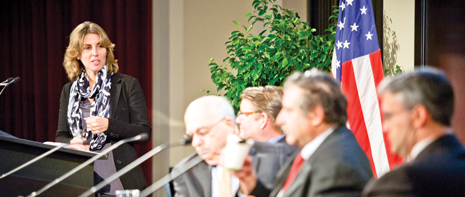Innovative thinkers
Dr. Amy Myers Jaffe:
Navigating the next energy revolution
|
When it comes to tackling the key energy issues our world is facing, Dr. Amy Myers Jaffe is never one to shy away from even the most challenging—and at times, controversial—discussions. As the author of more than a hundred published articles on energy economics, foreign policy, and oil, natural gas and sustainability geopolitics, Jaffe, director of Rice University’s Energy Forum at the Baker Institute, believes that the next five years is all about revolutionary breakthroughs—and a paradigm shift in the way we see energy.
Jaffe, who graduated from Princeton University with a degree in Near Eastern Studies and Arabic, initially became interested in the energy industry because of its vast impact on the global economy, as well as the daily lives of individuals. The ever-changing dynamics between foreign policy and energy sustainability became the forefront of her studies, as did OPEC’s strategy toward declining production rates and the promise of new unconventional resources. “It is all cyclical,” Jaffe said. “I’m hoping that this time, we’ve now put to death the idea of peak oil. If the shale boom has taught us anything, it’s that when prices go up, things that were uncommercial before become commercialized, and then they don’t stay at the higher cost structure.” Jaffe sees technology at the forefront of our industry’s ability to tackle challenges head-on, including those emerging from unconventional resource plays. “Now we’re going to see truly revolutionary breakthroughs in drilling and producing unconventional resources. Really game-changing. This is going to include new, improved technologies for producing heavy oil shale, instead of just oil from shale.” While technology is driven by the demand to successfully and safely produce new resources, Jaffe believes that educating the public is a key factor in promoting a healthy energy future. We’re used to thinking that we’re going to send our oil companies to some far-away place and that oil production is going to be limited to places where no one lives. Or in the case of the U.S., Texas and Louisiana,” Jaffe said. “The great thing is that a lot of this shale is located where people live. It’s a great thing for energy security and for cost. But it’s a whole mindshift. ‘Am I really willing to have resource development in the backyard of my neighborhood?’.” From principals of conservancy to the impact of technology, such as hydraulic fracturing, Jaffe believes the public is ready and eager to understand the science behind the major energy issues affecting their lives. “There are scientific realities. We need to make policy based on those realities. We don’t want to have our energy policy based on fear. As a public, we have to learn something about science and engineering. That’s sort of the lesson from Macondo: We didn’t think we cared to know about the technology for offshore drilling, and then all of a sudden, we did. We realized we could understand what people were explaining, and then we could make a better assessment.” Jaffe believes there is one key factor that will connect all technology, education and lessons learned: a new-found trust and willingness between the public and the government to work in tandem. “The public does not trust our regulators to do their jobs, because when we look at the BP accident, there was this problem of the government being asleep at the wheel,” Jaffe said. As regulators are working to modify and advance safety regulations, Jaffe believes that the public has to be willing to do their part as well. “We have to make choices ourselves. Are we willing to pay to be where we need to be? Or are we just going to stop drilling? What are you personally willing to do to reduce your energy consumption?” Jaffe asked. “There’s this disconnect between flipping on the switch at home and understanding what fuel was behind that. And why am I paying for that fuel. The commitment to change has to be on both ends.” |
- Prices and governmental policies combine to stymie Canadian upstream growth (February 2024)
- U.S. producing gas wells increase despite low prices (February 2024)
- U.S. drilling: More of the same expected (February 2024)
- U.S. oil and natural gas production hits record highs (February 2024)
- U.S. upstream muddles along, with an eye toward 2024 (September 2023)
- Canada's upstream soldiers on despite governmental interference (September 2023)
- Applying ultra-deep LWD resistivity technology successfully in a SAGD operation (May 2019)
- Adoption of wireless intelligent completions advances (May 2019)
- Majors double down as takeaway crunch eases (April 2019)
- What’s new in well logging and formation evaluation (April 2019)
- Qualification of a 20,000-psi subsea BOP: A collaborative approach (February 2019)
- ConocoPhillips’ Greg Leveille sees rapid trajectory of technical advancement continuing (February 2019)



